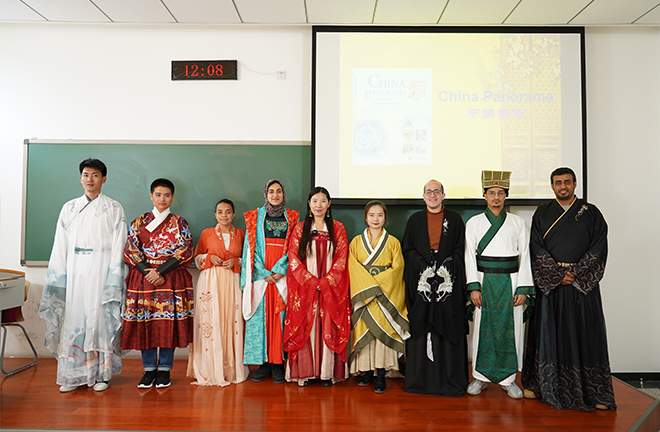Looking forward to Chinese culture’s spread in Egypt

Overseas students at the University of Chinese Academy of Sciences Photo: Courtesy of Cao Zhihong
China is an extremely large country, and I have always found the history of China interesting. It is nice to hear a different worldview and history from a culture that has been around for so long.
Unique Chinese culture
Firstly, Chinese food. The history of Chinese food in China stretches back thousands of years and has changed from period to period in each region according to climate, imperial fashions, and local preferences. Each province in China has its own food. From my experience, I have tried Sichuan dishes such as hotpot and mapo tofu, as well as other dishes that are too delicious.
The architecture of China is as old as Chinese civilization. From every information source—literary, graphic, and experiential—there is strong evidence testifying to the fact that the Chinese have always employed an indigenous system of construction that has retained its principal characteristics from prehistoric times to the present day.
The Egyptian people have good information about Chinese culture, such as hot water, green tea, and beautiful dresses called Hanfu, and we also love Chinese TV dramas and movies, such as Jade Dynasty, My Girlfriend is an Alien, Guardian, Chinese Zodiac, and so forth. Some Chinese actors, such as Jackie Chan, are very famous in Egypt. The handmade goods Chinese people craft are truly amazing.
I am looking forward to learning Chinese culture and spreading it in my country. For example, a Chinese daily routine: they start working from 8:00 or 9:00 in the morning, and then in the afternoon till 5:00 or 6:00pm after a lunch break. I found it convenient and more efficient for Egyptians. I like the group dancing in the square because it gives off positive energy and is very healthy. I am so obsessed with the Chinese security system and cameras which can be found everywhere.
Unique Egyptian culture
Egypt is a great country that has a rich history and culture that dates back thousands of years, starting with the Pharaonic culture, then Christianity, and Islam. Egyptian culture is filled with unique customs, history, religion, art, and literature. Egyptian culture has had a major impact on civilizations throughout history.
Family is very important for the Egyptian people due to its social aspect. In Egypt, an individual’s social class is determined by their family’s history and social class. Social standing is not solely focused on wealth. For the Egyptian people, family is more than blood. Family is what determines their status within society. The people of Egypt believe in class and follow a more traditional form of etiquette.
If you would like to see the birthplace of modern Arabic literature, Egypt should be your targeted destination, as it has always been the location of the most unique literature through the history of mankind. Ancient Egyptians took the first step towards establishing civilization by writing on papyrus, on the walls of their temples and tombs, and then huge innovations occurred with the development of a writing system and with the different types of thought, which reached us through great Egyptian writers including Taha Hussein(1889-1973), nicknamed the Dean of Arabic literature; Yusuf Idris (1927-1991), who is considered to be the master of the Arabic short story; and Naguib Mahfouz (1911-2006), the only Arab novelist to win the Nobel prize for literature.
Cooperation is the glue
Egypt and China are agricultural countries. Agriculture completely changed the way human beings interacted with their environment. Plant and animal domestication was a long and slow process that soon took over every corner of the world. It became embedded in ancient people’s lifestyles and religions.
Relationships are powerful. Our one-to-one connections with each other are the foundation for change. Building relationships with people from different cultures—often many different cultures—is key to building diverse communities that are powerful enough to achieve significant goals. Cooperation between two different countries among young people, based on trusting relationships, is the glue that holds people together as they work on a common problem. As people work on challenging problems, they will have to persist together when things get hard. They will have to support each other to stay with an effort, even when it feels discouraging. People will have to resist the efforts of those who use divide-and-conquer techniques, pitting one cultural group against another. Cooperation between young people can prevent disasters in every field: agriculture, engineering, culture, education, art, and science. We have adapted many techniques in Egypt’s agricultural field and learned from the Chinese system, such as greenhouse techniques, and many plants native to Egypt are cultivated in China.
I think the Chinese culture and lifestyle are suitable for the Arab people. Broadly speaking, China is a great country because of its history, culture, art, and science, and we must follow the Chinese system to develop our countries.
Radwa Salah is a doctoral student from Wuhan Botanical Garden at the Chinese Academy of Sciences, and a teacher from the Faculty of Agriculture at Minya University, Egypt. This article was edited from an exclusive interview of Radwa Salah by the CSST reporter Chu Guofei.
Edited by BAI LE
